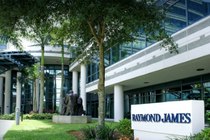

The broad stock market gains of the first six months of the year, with the S&P 500 increasing more than 15%, propelled a strong quarter for Raymond James Financial Inc., which has 8,704 financial advisors across its various employment channels.
Raymond James reported Wednesday after the market closed that its domestic private client group, the largest part of its business had net new assets of $14.4 billion for the quarter ending June 30, a 5.4% annualized growth rate from March 1. The company also reported at the end of June record client assets under administration of $1.28 trillion and financial assets under management of $200.7 billion.
Higher assets translate into higher fees for firms and revenue for firms like Raymond James, which saw record quarterly net revenues of $2.91 billion, an increase of 7% over the same time last year and 1% over the preceding quarter.
Meanwhile, the firm reported the departure of 60 financial advisors with close to $4.6 billion of assets under administration. Those advisors were part of a large group of independent contract financial advisors, according to CEO Paul Reilly.
"This was a planned and mutual separation, and more than 60% of the assets and advisors stayed with Raymond James." said Reilly, who was speaking to analysts Wednesday afternoon to discuss the quarter's earnings results. He did not name the group or branch office that the advisors left.
Later in the call, he was asked by an analyst for more details about what led that group of advisors to leave Raymond James.
Reilly responded he was not going to speak about specific firms, only alluding to “strategic differences” in both businesses.
Raymond James ended June with 8,704 total financial advisors, which is a 1% increase from the same quarter last year and basically flat when compared to the end of March.

Can an annuity help your clients get there?

The leadership changes coming in June, which also include wealth management and digital unit heads, come as the firm pushes to offer more comprehensive services.

Strategist sees relatively little risk of the university losing its tax-exempt status, which could pose opportunity for investors with a "longer time horizon."

As the next generation of investors take their turn, advisors have to strike a fine balance between embracing new technology and building human connections.

IFG works with 550 producing advisors and generates about $325 million in annual revenue, said Dave Fischer, the company's co-founder and chief marketing officer.
RIAs face rising regulatory pressure in 2025. Forward-looking firms are responding with embedded technology, not more paperwork.
As inheritances are set to reshape client portfolios and next-gen heirs demand digital-first experiences, firms are retooling their wealth tech stacks and succession models in real time.
